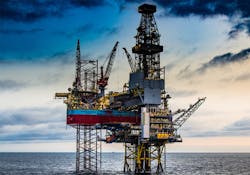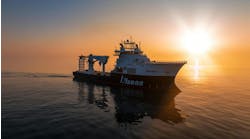Offshore staff
LYNGBY, Denmark – The Maersk Intrepid has started first operations following its conversion to a hybrid, low-emission drilling rig.
The jackup has been working in its new mode for Equinor on the Martin Linge field development in the Norwegian North Sea.
Since the program started in November, readings show reductions of fuel consumption and CO2 emissions of around 25% compared to the baseline average for the rig.
In addition, NOx emissions fell by around 95%, above the original target of 90%.
This is one of various initiatives Maersk Drilling is working on to reduce its CO2 emissions intensity by 50% by 2030. Others include operating rigs on shore power and participation in the Project Greensand consortium, targeting re-use of shut-in fields offshore Denmark for permanent storage of CO2.
In the Maersk Intrepid’s case, Equinor has provided support through introducing compensation formats in order to stimulate emission reductions. The upgrades combine use of hybrid power with NOx conversion units, adding data intelligence to further reduce energy consumption and CO2 emissions.
Hybrid, low-emissions upgrades are also under way on the harsh environment jackup Maersk Integrator, which should start operating in full low-emission mode offshore Norway early next year.
For both rigs the package comprises three upgrades:
- Hybrid power. Installing energy storage via use of batteries, allowing basic energy needs to be covered by fewer engines operating at higher intensity, supplemented by battery power. This set-up also allows for recovery of braking energy.
- Energy Emission Efficiency software. The cloud-based Energy Emission Efficiency software developed by Maersk Drilling uses real-time data to monitor energy use on the rig, allowing, for example, engines to be switched off engines when they are not needed.
- Selective Catalytic Reduction units to reduce NOx emissions. These capture NOx exhausts and use ammonia injections to convert the gas into harmless water and nitrogen.
12/17/2020



